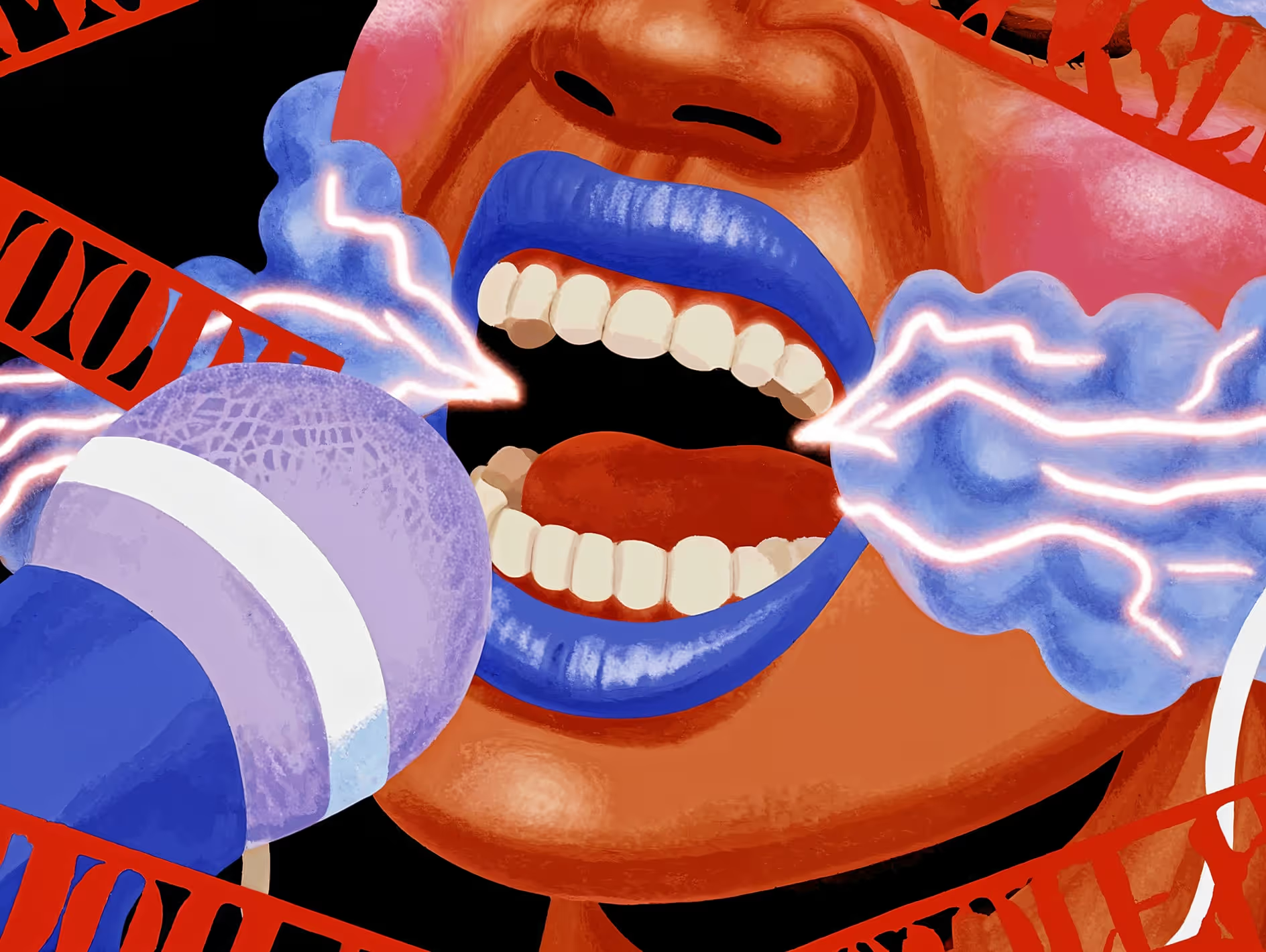
Censorship Is Not a Kink: How Matt Slayer Fights Back

I don’t know if you’ve noticed, but the internet is a weird place. People argue about everything: cheeseburgers, gas station bathrooms, the best way to eat cereal. Nothing is sacred, and someone always has an opinion they’re dying to share.
Sex, naturally, is no exception.
We’re not diving into all that today, but it’s worth looking at how platforms like Instagram, TikTok, and YouTube police adult content, even when it’s clearly labeled, non-explicit, and made for grown-ups. TikTok bans nipples but promotes misinformation, so the rules? Not exactly black and white.
TikTok removed over 169 million videos globally in the second half of 2023 for content violations, but only 0.1% were for "adult nudity and sexual activity." Meanwhile, a 2023 NewsGuard study found that nearly 20% of health-related TikTok videos contained misinformation.

Strategic Pixelation
Which brings us to Matt Slayer, host of And Now We Drink, a podcast that lives at the messy intersection of comedy, culture, and adult entertainment. It’s not an easy gig in today’s algorithm-driven world. Slayer’s had heavy-hitters like comedian Sam Tripoli and Tokyo Vice author Jake Adelstein on the show.
But the real bread and butter? Candid, unfiltered conversations with stars of the adult film industry, people the internet simultaneously ogles, shames, and censors.
Slayer went from being a private investigator staking out creeps and criminals to linking up with his original co-host, who happened to be in the adult biz, and soon found himself talking shop with some of the biggest personalities in the skin game. (Slayer had long been involved in the adult world prior to the podcast, doing various non-camera roles.)
The show was never meant to focus solely on porn stars. It’s always been about unfiltered conversation. Some big-name comedians and actors have expressed interest, but get squeamish once the drinks are flowing and the questions get real. Some guests have shared too much truth and requested that their episodes be withheld from the air. Slayer’s got that knack about him; he’s a pro at getting the funny stuff out of people.
“I’ve had mainstream actor friends flat-out refuse to do the show; they’re like, ‘That’ll hurt my career,’ which is stupid,” Slayer says. “I can’t control how people perceive things, and I’m not changing the show to cater to that. When I cut clips for social, I dance on the line. What's too much; what can I get away with? I censor profanity, avoid the outright insane stuff, but I still lean into the provocative. It’s a tightrope I’ve learned to walk through trial and error.”
Fighting the Shadowban
And Now We Drink has become part free speech battleground, part clubhouse for folks with stories you don’t hear anywhere else. Because he straddles both sides of the culture — mainstream and adult — Slayer sees how murky the waters have become around what’s “allowed” and what’s deemed taboo.
“The industry’s in scramble mode right now,” he says. “Every day brings a new fire to put out, not unlike the rest of America. There’s this wave of age verification laws sweeping the country that, on paper, sound reasonable. No one — especially in the industry — wants minors watching porn. But in practice, these laws are chilling free speech.”
Adult content is protected speech. But when users are required to upload IDs or even biometric data to access a site, most opt out. They bounce to offshore or sketchy platforms. Ironically, companies that try to play by the book often get punished. Pornhub used to be Public Enemy No. 1 for piracy.
Now? It’s basically naked YouTube. Love it or hate it, it’s the default distribution hub.
Navigating Big-Time Change in Real-Time
The double standard is impossible to ignore: Bert Kreischer can puke mid-set on YouTube. Fresh & Fit can platform misogynists under the banner of “debate.” But a porn performer talking about their job? “Community Guidelines Violation.”
To dodge the algorithmic ban hammer, Slayer plays the game: Audio bleeps over the word “porn.” Thumbnails cropped to hide anything “suggestive” — even tank tops. Uploading the same clip three times with slightly different edits to see which version survives.
It’s a chess match against code, moderation teams, and AI filters. For people working in adult entertainment or simply discussing it, staying visible without getting deplatformed is a daily challenge. One of the biggest challenges of running a podcast like this is the need for social media to attract new listeners, even if the clicks aren’t driven by explicit content.
David Kaye, UN Special Rapporteur on freedom of expression, summed it up: "One of the greatest threats to online free speech today is the murkiness of the rules."
YouTube has demonetized or removed LGBTQ+ content at higher rates than comparable non-LGBTQ content, according to a 2023 GLAAD report. A 2022 study found TikTok shadowbans terms like "sex worker" or "OnlyFans" while allowing similar discussions when framed as “relationship content” or hosted by men.

What is Censorship, Anyway, in 2025?
Within the world of the adult enterprise, there are unspoken rules. For Matt Slayer, he needs to find the sweet spot between how someone perceives themselves and how they want the world to see them, both as a person and a persona.
"I don’t really think of it as an interview; it’s more like capturing a conversation. There aren’t a lot of hard-and-fast rules. Before we start, I’ll ask what’s off limits, and beyond that, it just goes where it goes. Some guests have boundaries, especially around family stuff, childhood, or partners. For some performers, talking about that breaks the illusion of sex appeal. But it really depends on the person. Sometimes someone says, ‘I’ll talk about anything,’ and then I crack a joke and suddenly it’s like, ‘Whoa, maybe not that one.”
Being a podcaster isn’t easy. After you land the guests, you’ve to get people even to hit the listen button. That’s no easy task when every dude in his basement thinks he’s the next Joe Rogan. The bellicose world of making money isn’t as easy as buying a mic off Amazon. Slayer was candid about this.
The Electronic Frontier Foundation has been documenting moderation problems for years. They want platforms to exist with better, more transparent governance. "The system of moderation is also inherently inconsistent. Because it relies largely on community policing, some users are bound to be more heavily impacted than others."
Creators have to make money however they can. It’s a hustle. “Monetization in 2025? First, you’ve got to survive being a podcaster at all. There are so many podcasts out there. I talk to people. I have to be funny, informative, and make people want to keep listening. The biggest challenge is standing out in a very crowded landscape. There’s no slowing down. You have to be consistent with your releases. Your audience has to know week in and week out your content will be there for them. That means keeping content in the can so you always have a release.”
The stats are heinous:
- Less than 10% of Spotify’s 5 million podcasts are considered "active" (released in the last 90 days).
- Only 1% of podcasts make money through sponsorships or subscriptions. Most podcasters make less than $100 per episode or nothing at all.

I Fought the Law and the Law Won
In 2024, over 24 states passed or proposed age verification laws for adult websites, requiring photo IDs, biometric scans, or credit‑card checks. In June 2025, the U.S. Supreme Court upheld Texas’s H.B. 1181, ruling that states may enforce these measures for sites that are over one-third “sexual material harmful to minors,” while Kansas and Missouri are now implementing their laws following that decision. Florida’s legal challenge to its law was just dropped, so its verification mandate (part of HB 3) is moving forward. Despite these rules, compliance is sketchy. Virginia still allows access to many top sites, and VPN usage is surging in states with restrictions. Meanwhile, social platforms like TikTok and Instagram are flagging “sexual content” as mild as cleavage or the term “sex ed,” raising concerns about overreach.
Because And Now We Drink isn’t safe for work, there’s a lot of red tape. That affects how Slayer makes a living. People watch the clips. But without multiple income streams, the creator is at the whim of the platform.
“One of my biggest challenges is that my content is, by nature, not safe for work. A lot of the topics I cover make people uncomfortable, even though most people either have sex or want to. Porn is a billion-dollar industry. But because sex is still taboo, there are constant hurdles. Take YouTube: my channel was demonetized for allegedly violating their ‘sexual gratification’ policy, which is complete bullshit. I’m not here to kink-shame. If anyone’s having their own good time on a two-hour interview podcast, more power to them, but that’s not my show’s intent. According to YouTube’s own examples, I fall within the monetization rules. There was no warning, no new upload, just a manual review on an older episode. Twenty minutes later, the entire channel was demonetized.”
“The appeal was a joke. I got a generic rejection in under two days. They won’t say what flagged the violation, but told me to ‘clean up my act’ and reapply in July. How do I course-correct if we fundamentally disagree on what violates policy? Meta lets my content rack up millions of views on Instagram but doesn’t pay a cent. Twitter? That’s its own shit pile. They changed how links work, so even if a clip goes semi-viral, good luck getting anyone to click through. The whole system’s stacked against creators who talk about sex seriously.”
The Fight for a (Non-Traditional) Career
Adult performer Natassia Dreams gets it: "Now I have it back and I'm treading lightly, very carefully, but last time I got deplatformed I didn't post anything explicit, I posted a workout picture." So what do you do? You keep moving through burnout, wanting to ease up on the gas. Slayer gets it.
“I have no choice but to go forward. What am I gonna do? Pack it up? Burnout’s real. I’ve been producing a weekly show for over nine years. That’s well over 400 episodes. But I keep going.” He continued, sighing. “I’m not a ‘social media creator,’ I’m a podcaster, but I’ve gotta utilize the platforms to get listeners. I’ve had Twitter since 2009. Instagram since I got an iPhone. I use it as a marketing tool. A lot of the viral success I’ve had comes from understanding the platform and not giving a fuck about what people think.”
And Now We Drink isn’t an outlier. The problem with censorship is multifaceted. Adult creator Lucy Banks said in Dazed it’s "difficult to just exist online as a sex worker," citing how FOSTA-SESTA made it harder to maintain a presence.
When Rebecca Crow lost her account, she told The Washington Post, "After my 725k-strong account was deleted, I didn't think anything else could be as devastating to my career. [Instagram's censorship] leaves already precarious sex workers without any platform for online promotion." She then tried to take Instagram to court in 2020.
The beat goes on. OnlyFans creator Stephanie Michelle lost everything: "Starting from scratch is so demoralizing and humiliating. You feel like these platforms are laughing at us, like, 'Haha, you think what you’ve earned is worthy.'"

Censorship is Not a Kink
What Matt Slayer’s And Now We Drink experiences isn’t an isolated incident; it's a symptom of a system that can’t define its own rules. The fact that he's been producing content for 9 years and still can't predict what gets flagged shows that these platforms haven’t figured out governance; they’ve just automated confusion.
What’s a guy to do when he just wants to have a couple of cocktails and hear how the world works, even if people have their clothes off? Matt Slayer keeps his mic on and hopes the laughs and spicy takes keep coming. After nine years and 400+ episodes, Slayer is still playing a chess match where the rules change without notice.
This isn't innovation in content governance, it’s the automation of arbitrary power. When a handful of unelected tech execs can decide what constitutes acceptable discourse for billions of people, using algorithms they don’t understand, we’re not just talking about creator economics.
We’re talking about who gets to speak in the digital age and who decides. Censorship is not a kink. For creators like Matt Slayer, it’s sure as hell not consensual.




© 2025 Manychat, Inc.

